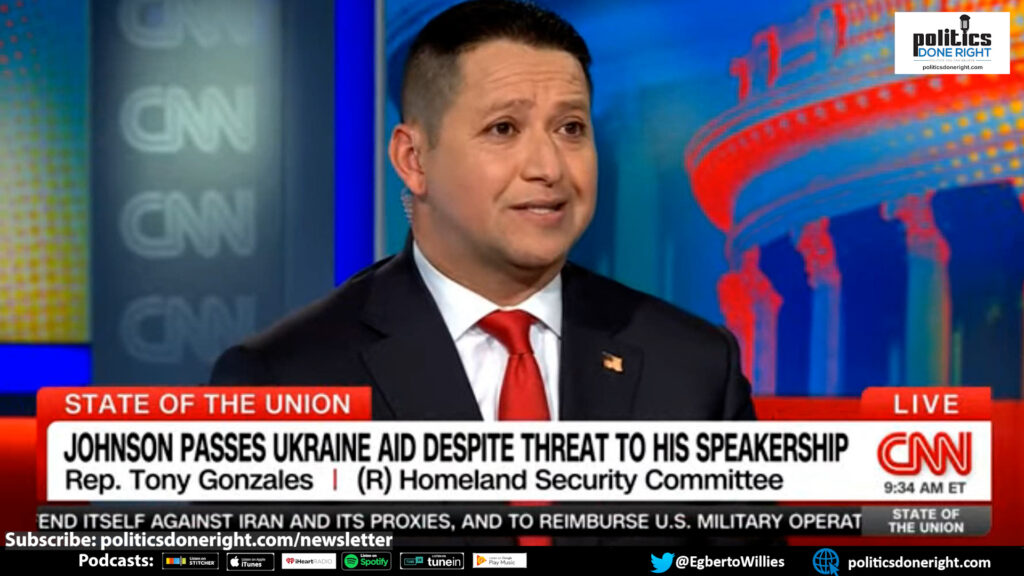Congressman Tony Gonzales (R-TX) did not mince his words as he slammed a sect within the Republican House with adjectives seldom used by politicians.
Republican finally slams colleagues!
Podcasts (Video — Audio)
In a striking display of dissent within the Republican Party, Representative Tony Gonzalez of Texas recently made headlines with his unvarnished critique of certain colleagues in Congress. Gonzalez, who served 20 years in the military before joining Congress, did not mince words when he described some of his Republican peers as “scumbags” who resemble members of the Ku Klux Klan, not only in ideology but in their overt actions. This extraordinary rebuke from a member of the GOP underscores a profound rift within the party, bringing to public attention what many have speculated: a radical fringe within the Republican Party that espouses extremist views and engages in conduct unbecoming of their positions.
One should note that while Gonzales was referring to a small number of Republicans holding the party hostage, they are all complicit for being timid when it mattered in past actions and votes. This empowered a select few and allowed the cauterization of dysfunction as normal.
Gonzalez’s comments were prompted by discussions about the stability of House Speaker Mike Johnson‘s leadership, particularly against threats from far-right members like Marjorie Taylor Greene, who are known to provoke internal party conflicts. The discussion took an intense turn as Gonzalez highlighted the actions of fellow Republicans such as Matt Gaetz and Bob Good. He accused Gaetz of engaging in criminal activities with minors at drug parties and condemned Good for endorsing a candidate with Neo-Nazi ties. This severe condemnation from within their own ranks exposes a troubling tolerance for extremist and immoral behavior that Gonzalez argues has become normalized within the party.
What makes Gonzalez’s statements particularly potent is his direct reference to the symbolic white hoods of the Ku Klux Klan, suggesting that the extremist actions and ideologies of some Republican members are not just a private embarrassment but are now proudly displayed in public arenas. Such comparisons draw a chilling parallel between the historical violence and racism of the Klan and the current behaviors and affiliations of these Republican members. Gonzalez’s frustration is palpable as he reflects on his military service and commitment to honor, starkly contrasting with the actions of those he criticizes.
This public rebuke is significant for its content and source—a Republican congressman calling out his colleagues, which disrupts the often monolithic portrayal of party unity. By doing so, Gonzalez challenges the party’s leadership and membership to reflect on their values and the behaviors they tolerate in their ranks. This call for introspection is crucial as it comes at a time when the Republican Party is at a crossroads, struggling to define its identity in the post-Trump era.
Furthermore, Gonzalez’s remarks hint at a broader issue within American politics: the normalization of extreme rhetoric and actions. By lowering the bar for acceptable conduct, the party risks aligning itself with the most detestable elements of American history. The congressman’s bold stance serves as a beacon for those in the party who oppose the radicalization of their ranks, urging them to take action rather than passively allowing such behaviors to define the GOP.
The implications of these developments are profound. They suggest a potential shift in party dynamics and possibly a realignment of political affiliations if traditional Republicans distance themselves from the extremist elements that Gonzalez critiques. His suggestion that radical members should be metaphorically “put in a box” is a call to isolate and marginalize those who do not represent the party’s core values, as seen by its more moderate members.
Gonzalez’s outburst is more than just a fleeting news headline; it is a clarion call for urgent reflection within the Republican Party. It underscores the need for leaders and members alike to consider the moral and ethical implications of their affiliations and actions. As America grapples with complex social and political challenges, the character and conduct of its leaders are of paramount importance. Gonzalez’s critique reminds us that integrity and decency must be non-negotiable in public service, pushing back against the creeping normalization of extremism.
The progressive community must view Gonzalez’s revelations as necessary for political transparency and accountability. They should see this as part of a broader struggle against systemic racism and extremism that has found new footholds within certain political circles. For progressives, Gonzalez’s actions provide an opportunity to advocate for greater ethical standards in government and to rally support for candidates who commit to upholding these values. In doing so, they aim to reshape the political landscape into one where such extreme behaviors and affiliations are unequivocally rejected by all parties, reflecting a more just and equitable society.
As the discourse around these issues continues to evolve, it will be essential for all engaged citizens to participate actively in political processes, ensuring that their voices are heard. The unfolding situation within the Republican Party will undoubtedly serve as a critical case study in the enduring battle for the soul of America’s political institutions.
Viewers are encouraged to subscribe and join the conversation for more insightful commentary and to support progressive messages. Together, we can populate the internet with progressive messages that represent the true aspirations of most Americans.

